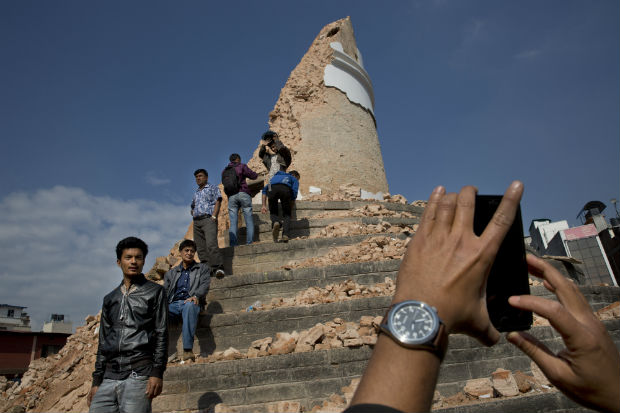
Locals take snapshots with their cell phones at the historic Dharahara Tower, a city landmark, that was damaged in Saturday’s earthquake in Kathmandu, Nepal, Monday, April 27, 2015. AP
NEW DELHI — After spending the night huddled in a car with his family at the airport fearing for their safety, Michael Mackey is among thousands of tourists who flocked to Nepal for spring holidays and are now desperate to leave the quake-hit nation.
The New Zealander, his wife and three sons were in a cafe in the capital Kathmandu when the 7.8-magnitude quake struck Saturday, forcing them to flee outside as surrounding buildings shook and toppled.
“There was extensive damage to buildings around there. After that, we didn’t stop and came all the way to outside the airport,” said Mackey, who has spent three weeks holidaying in the Himalayan nation where the death toll has passed 3,200 people.
“We are still trying to get through to our travel agent to book any flight to leave Nepal.”
With its stunning mountains and rich cultural history, Nepal is a drawcard for foreign tourists every year — almost 800,000 in 2013 — many of them climbers heading straight to Everest and surrounding towering peaks.
Others travel to the adventure-sports town of Pokhara, gateway to popular trekking routes around the Annapurna mountain range.
Tourist dollars provide much-needed revenue for impoverished and land-locked Nepal, whose economy is in tatters from prolonged political instability since the end of the country’s civil war in 2006.
But Mackey is among streams of travelers trying to leave after the devastating quake ripped apart infrastructure, destroying buildings and roads and paralyzing communications.
It is unclear how many foreigners are among the dead, including on Mount Everest, where at least 18 people were killed in avalanches sparked by the quake.
Neighboring India has evacuated close to 1,000 nationals on military aircraft since Saturday, but foreign secretary S. Jaishankar said it was difficult to know how many were left in Nepal.
China, which has lost four nationals in Nepal, said Monday it had evacuated more than 1,000 of its citizens and that airlines were racing to fly out 4,000 stranded tourists.
The Red Cross has launched a website to help worried families try to make contact with loved ones.
Everest tragedy
Nepal’s climbing community was left reeling from the second tragedy to hit the Everest climbing season in two years, after 16 Sherpas died in an avalanche in April 2014 in what was previously the deadliest disaster in the mountain’s history.
At least two Americans died in the avalanche, a doctor working for a mountain guide company and a Google executive, their organizations said.
Japan’s foreign ministry said that at least “one (Japanese) man in his 50s” was killed in the avalanche that struck Everest base camp Saturday, and was working to confirm the whereabouts of 1,011 Japanese workers in the country.
Israel said it plans to airlift 25 infants born to surrogate mothers from quake-hit Nepal, and was sending a military delegation to repatriate about 700 Israelis in the country.
The UK Foreign Office said hundreds of Britons were known to be visiting Nepal but that no deaths had been reported.
Authorities have confirmed the safety of more than 830 Australians in Nepal at the time of the quake but about 200 are still missing, the Associated Australian Press reported.
‘We have a flight out’
With aftershocks still rattling the country, Czech tourist Martin Hulla has been camping at night in the gardens of the royal palace in Kathmandu, rather than take a chance staying in quake-damaged buildings.
“It was very cold. Now we have got a flight out of Kathmandu, to Thailand,” Hulla told AFP.
After initially fleeing his hotel room empty handed, the 26-year-old returned to collect his valuables and later his luggage.
“We were resting on our bed at the time of the earthquake. We rushed out of our hotel as the building started shaking very strongly,” his travel partner, Marie-Laure Parsy, said.
For some swept up in Nepal’s latest tragedy, the urge to leave has been overtaken by the desire to stay and help, in any way they can.
Portugese tourist Heli Camarinha had only just arrived in Nepal the day before the quake struck. Travelling alone, the 28-year-old headed straight for one of Kathmandu’s overwhelmed hospitals to pitch in.
“When I saw the local news that hospitals need volunteers, I decided to come here to try and help,” Camarinha told AFP.
“I have a first aid certificate and some experience in social work back home.
“I have been doing whatever I can, from cleaning the patient wards, helping transfer them to different hospital floors on stretchers, basically any way possible.”
RELATED STORIES
Survivors’ tales from Everest avalanche horror
Robbery saved 9 Greek climbers from Nepal quake